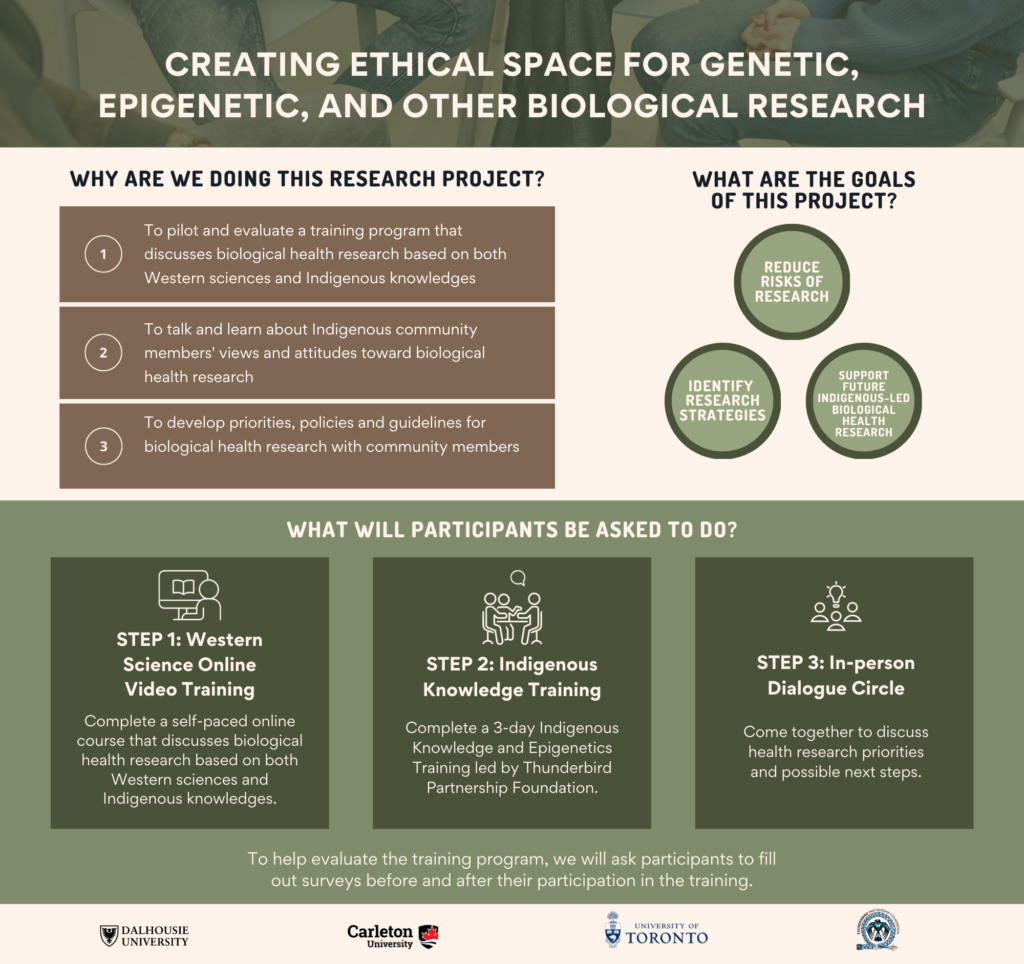Creating Ethical Space for First Nations-led biological research
Significant mental and physical health inequities exist between Indigenous and non-Indigenous populations in Canada. A greater appreciation of biological processes that contribute to Indigenous health inequities has explicitly been called for by Indigenous researchers, particularly as scientific advances lead to the development of more effective intervention strategies.
There are growing numbers of collaborations between communities and researchers carrying out biological research that have resulted in benefits for Indigenous peoples, but these projects remain relatively rare. Our team has identified the need to create ‘Ethical Space’ (a term coined by Indigenous philosopher, Willie Ermine, which refers to the interaction of knowledge systems in a mutually respectful way) for research exploring biological factors influencing First Nations (FNs) health that integrates FNs knowledges and that is led by FNs people.
Part of this initiative involves a research project that aims to increase capacity and enhance opportunities for FNs communities, organizations, and students to lead and/or make informed decisions about participation in biological health research. The project takes place within a community-based participatory research framework in which the main community partner leading the project is Thunderbird Partnership Foundation (TPF), an Indigenous organization whose mandate is to provide a national voice advocating for Inuit and First Nations culturally-based and holistic approaches to addictions and mental health services. As part of this project, our research team developed an education training curriculum using a Two-Eyed Seeing approach and has been piloting it with First Nations communities across Canada. The curriculum explores genetic, epigenetic, and other biological processes involved in determining health and how biological research can benefit FNs communities. To ensure that the curriculum is offered within a Two-Eyed-Seeing framework that values Indigenous ways of knowing, it covers traditional teachings from FNs Elders and Knowledge Holders. The training also discusses how Indigenous Knowledge aligns with, expands upon, or differs from Western understandings. The pilot training involves: (1) a self-paced online course about Western perspectives on human health and development, (2) an in-person Indigenous Knowledge curriculum developed by TPF, as well as (3) a pre- and post-training evaluation survey to assess changes in participants’ views towards wellness, culture, and different types of research approaches. We hope that the curriculum can serve as a culturally safe tool that can be used in future community-based participatory research projects to create an ethical space that results in shared understanding and research opportunities led by FNs stakeholders.
Despite the stress and trauma experienced, Indigenous peoples continue to demonstrate their strength and resilience in various ways. To find out how various aspects of cultural identity and engagement can buffer against the negative effects of adversity and promote wellness, please click here.
To find out how the consequences of numerous harmful past and ongoing aspects of settler colonialism in Canada are contributing to health and social inequities relative to the non-Indigenous population in Canada, please click here.
To find out how our research has been used in various ways to benefit Indigenous peoples, including by providing evidence of the continued direct and intergenerational effects of the residential school system and the child welfare system so that Indigenous and non-Indigenous peoples can have a shared understanding of the legacy of colonialism in Canada, please click here.
To find out how we are examining the current landscape of Indigenous education curriculums in Canada and exploring best practices for educators and academics conducting Indigenous health research please click here.

Overview of Western Science Modules
Module 1: Introduction to health and wellness research
Indigenous Research as Storytelling
1.1 – Understanding Western Knowledge, Western Science, and Research
1.2 – Benefits of Community-led or Partnered Research for Indigenous Peoples
1.3 – Western Science Perspectives of Human Health and Development
1.4 – Assessing Health and its Determinants in Research with Indigenous Peoples (Part 1)
FNIGC: Data by First Nations for First Nations
1.5 – Assessing Health and its Determinants in Research with Indigenous Peoples (Part 2)
1.6 – Assessing Biological Factors in Research with Indigenous Peoples (Part 1)
Why Genetic Research Must be More Diverse
1.7 – Assessing Biological Factors in Research with Indigenous Peoples (Part 2)
Module 2: Our stress response
2.1 – The Initial Stress Response
How stress affects your brain – Madhumita Murgia
2.2 – Chronic Stress and Health
2.3 – Stress and The Immune System
2.4 – Positive Experiences, Coping Strategies, and Health
2.5 – Stress and Positive Experiences Across the Lifespan
2.6 – Intergenerational Effects of Stress and Positive Experiences Across Generations
2.7 – Summary and Future Directions
Module 3: Genetics and our genome
3.1 – Introduction to Genetics and Genetic Diseases
3.2 – Approaches to Genetic Research
3.3 – Rare Single-gene Diseases: SCID Among Navajo and Northern Cree
3.4 – Complex Diseases: Long QT Syndrome Among Gitxsan
3.5 – Gene X Environment Interactions: Type 2 Diabetes Among Pima Indians and Oji-Cree
3.6 – Genome-Wide Association Study: Type 2 Diabetes
3.7 – Genetic Variant Libraries Precision Medicine National Centre for Indigenous Genomics
NCIG: an introduction
3.8 – Summary and Future Directions
Module 4: Epigenetics and our epigenome
4.1 – Introduction to Epigenetics and the Epigenome
4.2 – Epigenetics and Adverse Health Outcomes
4.3 – Epigenetics and Positive Health Outcomes
4.4 – Epigenetics and Intergenerational Effects on Health
4.5 – Pathways of Intergenerational Epigenetic Transmission
4.6 – Summary and Future Directions
Module 5: Microbes and our microbiome
The Invisible Universe of The Human Microbiome (NPR)
5.1 – Introduction to Microbes, Microbiota, and the Microbiome
5.2 -Microbes and Physical Health
5.3 – Microbiome and Mental Health
5.4 – Treating Diseases with Good Bacteria
5.5 – Regional Microbiota
5.6 – Summary and Future Directions
Sample Video from the Training Course – Module 2.1: The Initial Stress Response